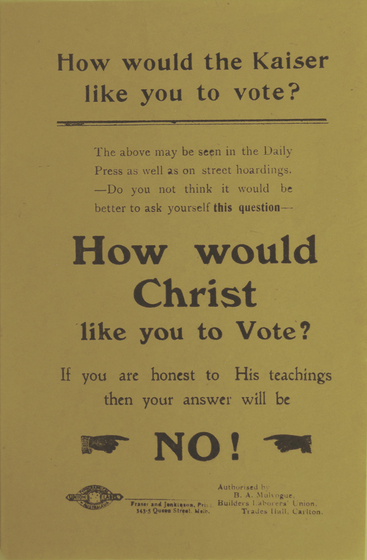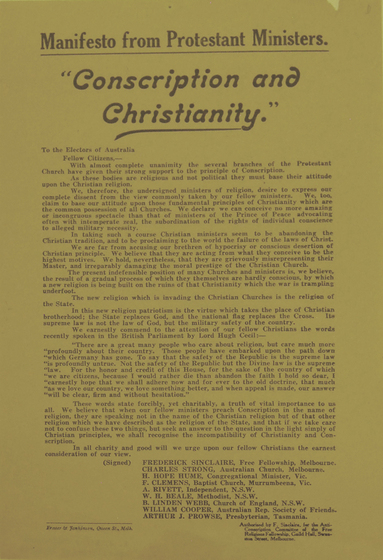Religious Perspectives on Conscription
Mainstream Protestant churches in Australia overwhelmingly supported the war. However, small, socially progressive churches were amongst the strongest supporters of the anti-conscription campaign.
At the start of World War One, nearly eight in ten Australians identifed as Protestants. Around half of those were Church of England, with Presbyterians and Methodists being the next two largest denominations. (Australian Catholics numbered a little more than 20% of the population; fewer than 5% listed themselves as non-Christian, non-religious or ‘Other’ in the Census.)
Religious leaders from all of these large Protestant groups supported conscription. Such Churches generally argued that the success of the Christian religion required the survival of democratic governments and thus that it was the duty of Christians to support the government in the war.
There were a few Protestant ministers who opposed conscription, like the Congregationalist Alfred Rivett, one of the signatories of the manifesto ‘Conscription and Christianity’. By the time of this manifesto, Rivett had been forced to resign from his position due to this viewpoint; his congregation overwhelmingly supported conscription. This experience was not unique, fellow Congregationalist Thomas Roseby and Methodist Bernard Linden Webb were two other ministers forced to resign for opposing conscription.
There were smaller religious congregations, however, who took an explicitly Christian anti-war position, and particularly opposed any compulsion to fight.
Two Melbourne groups that were particularly important were the Free Religious Fellowship, led by Frederick Sinclaire, and the Australian Church of Charles Strong.
The Religious Society of Friends, or Quakers, were less prominent in the anti-conscription campaign in Melbourne. However, they were a major part of efforts elsewhere in most other Australian cities, including Brisbane, Sydney, Adelaide and Hobart.
Less religious anti-conscriptionists would also draw attention to the messages of the Christian Bible to support their position.















